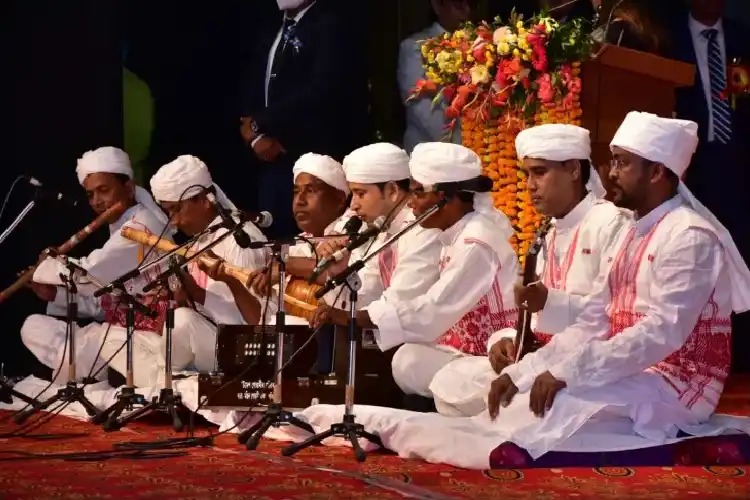
Daulat Rahman/Guwahati
Assam’s acclaimed scholar Dr Bhubaneswar Deka was originally a science graduate. Later he pursued humanity and did a BA (Bachelor of Arts) and triple MA (Master of Arts). Even after completing his higher studies in science and arts, he was thirsty for knowledge.
Despite belonging to a different faith, Dr Deka had an ardent desire to understand Islam as a religion and philosophy of life particularly in the context of Assam. His curiosity eventually made him Assam’s only PhD holder on Zikir & Zari, devotional songs prevalent among the Indigenous Muslims of Assam.
In 2011 the prestigious Gauhati University conferred Dr Deka with PhD for his comprehensive research project titled “Assamese Zikir & Zari: A Critical Study”.
In an interview with Awaz-The Voice, Dr Deka said he has been listening to Zikir since his childhood and his fascination for such devotional sons is only increasing every passing day due to its unique unifying power.
 A Zikr and Zari recital
A Zikr and Zari recital
He said Zikir took its root in Assam during the 17th century within the socio-cultural framework instituted by the Bhakti movement of Vaishnavite Saint Srimanta Sankardev (1449-1568) and under the patronage of Ahom (1200-1800) kings.
Even though Zikir and Zari are similar in tune, Zikir embodies the teaching of Islam mentioned in the holy Quran and Hadith whereas the Zari songs are based on the tragic episodes of the Karbala war tragedy. Zikirs were composed and popularized by the 17th-century Sufi saint and poet Hazrat Shah Miran, popularly known as Ajan Fakir. Ajan Fakir came to Assam from Bagdad in Iraq.
Dr Deka said while the lyrics of Zikir initially highlighted the spiritual aspects of the Quran and Hadith, Azan Fakir later started composing the same by incorporating the philosophy of “embracing all” propagated by Srimanta Sankardev.
 School students singing Zari and Zikir in a competition
School students singing Zari and Zikir in a competition“Zikirs were originally misconstrued to be spiritual songs of Islam and were kept hidden by some people. Since people of those ages were mostly illiterate, the Zikirs probably remained unwritten leading to the loss of many of them in due course of time. Over time, Zikirs were tuned on the line of Assamese folk songs such Biyageet, Aynaam, Dhainaam, and Tokari Geet, etc. Borgeet composed by Srimanta Sankardev and Srimanta Madhavdev had also influenced Azan Peer while writing lyrics and giving tones of Zikir,” Deka said.
Describing the relevance of the ideals of Srimanta Sankardev and Azan Peer Dr Deka in the present context Deka cited the example of how Assam remained peaceful after the demolition of the historic Babri masjid. He said there were communal clashes in the majority of areas in India after the Babri masjid was demolished. There were sharp reactions in some parts of Bangladesh, Pakistan and Afghanistan. “But Assam was an exception. With no incident of communal clash, the people of Assam had proved that they lived in the land of Srimanta Sankardev and Azan Peer. But not a single nagar or temple was destroyed in Assam after the demolition of the Babri masjid,” Deka said.
Another aspect that has been lately talked about is that some singers, nowadays, perform Zikir in their tune and music at different stages. But, no one is authorized to change the tune, lyrics, or instruments of zikir. Unfortunately, this is happening and pushing the original Zikir to the brink of extinction.
ALSO READ: Poll outcome endorsement of collective idea of India: Syed Mohammad Ashraf Kichhouchhwi
“It is high time for the Assam Government to introduce chapters on Zikir and Zari and Azan Peer in school, and college syllabi so that the present generation knows its value, learn the song, and preserve it for the future,” Dr Deka said.
